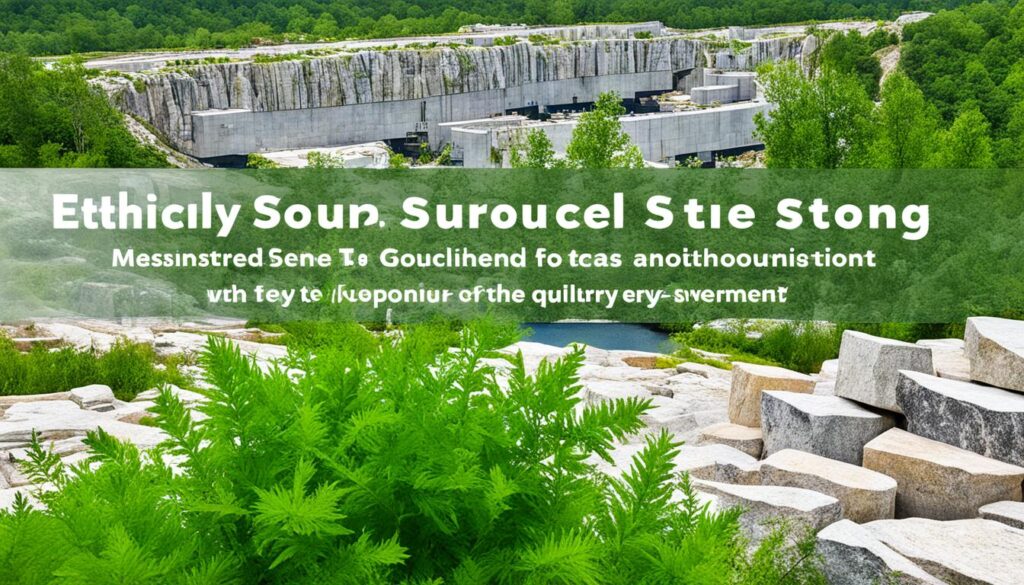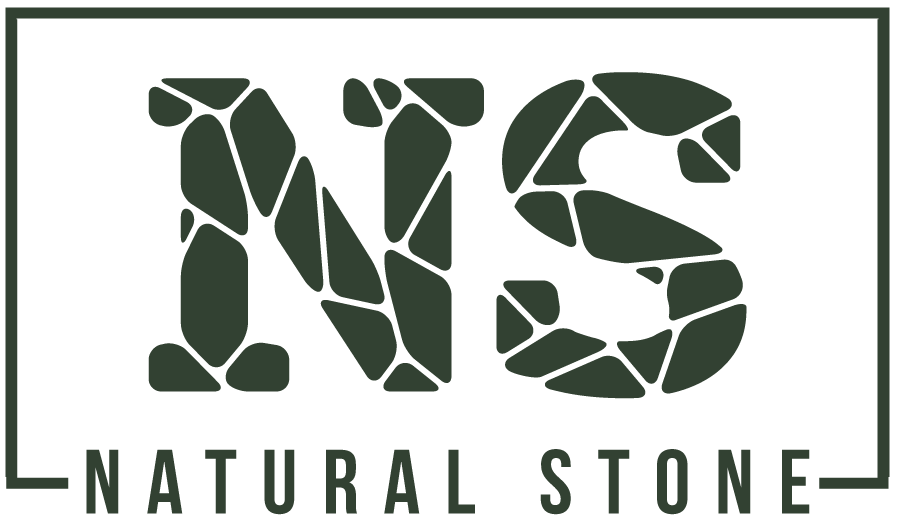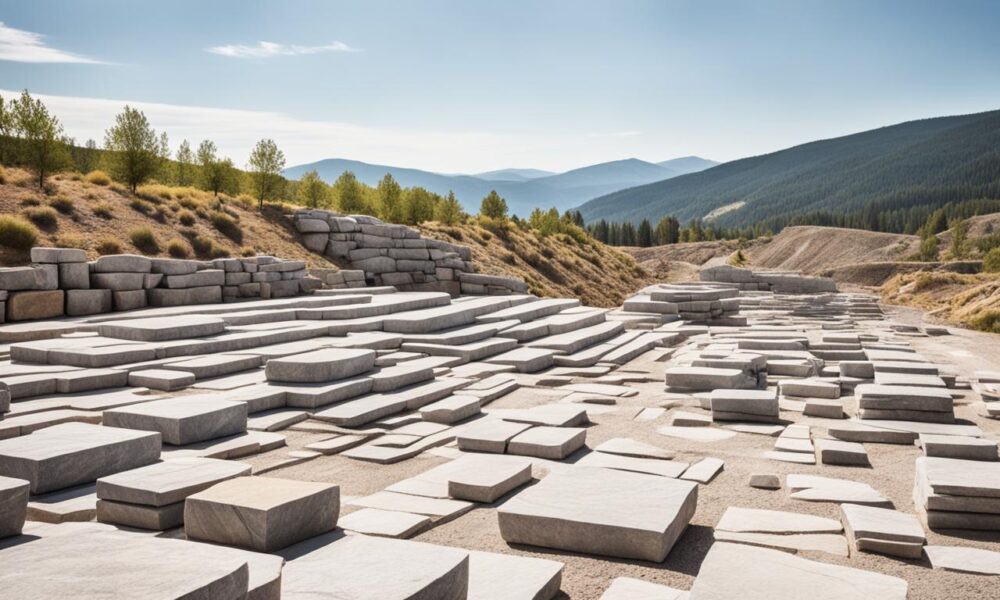Ethically Sourced Natural Stone: Insights & Tips
Ethically sourced natural stone is a mark of both quality and ethical business practices. It symbolizes a pledge to protect our environment and ensure fair work conditions. The Stone Federation advocates for combining ethics with sustainable mining methods.
The Modern Slavery Act of 2015 forced UK natural stone industries to act right. They had to ensure their supply chains were free from slavery and unethical practices1. To help, the Stone Federation created the Ethical Stone Register. This tool has three levels—Declaration, Verification, and Accreditation1—to show a company’s ethical practices.
Businesses like Amarestone are seeing more customers ask for ethically sourced stone. This demand shows the growing relevance of ethical sourcing in our world1. More companies are joining the movement, with major contractors and designers also on board. This teamwork emphasizes the importance of getting stone ethically1.
Key Takeaways
- The Modern Slavery Act of 2015 enforces responsible supply chain management within the natural stone industry1.
- The Ethical Stone Register offers Declaration, Verification, and Accreditation tiers for showcasing ethical sourcing credentials1.
- Growing client demand underscores the importance of ethically sourced natural stone in the industry1.
- Engagement across the sector demonstrates a collective shift towards sustainable and ethical procurement practices1.
- Leading contractors and designers are supporting the movement towards ethically sourced natural stone1.
The Importance of Ethically Sourced Natural Stone
Ethically sourced natural stone plays a critical role in fostering sustainability and protecting human rights. It also supports economic growth. Companies like Beltrami, Brett, CED, and Marshalls are leaders in transparent, accountable, and eco-friendly sourcing practices.
Environmental Impact
Ethical sourcing reduces the environmental impacts of quarrying. For example, Polycor recycles water in its production processes. It also uses excess stone to create other products, which lowers waste2.
Natural stone quarries, like those by Polycor, maintain ecosystem balance by avoiding chemicals in extraction2. The industry also finds new uses for stone dust, like in Vetrazzo’s recycled glass countertops. This adds an additional layer of sustainability2.
Human Rights and Labor Practices
Human rights and labor practices are crucial to ethical stone sourcing. Sri Lanka is known for its ethical sapphire mining, requiring licenses and banning child labor3.
Polycor ensures its stones are ethically sourced, maintaining clear custody chains2. Ethical sourcing helps eliminate forced and child labor, improves working conditions, and ensures fair wages.
Economic Benefits
Ethical stone sourcing brings many economic benefits. Companies can improve their reputation and increase market share. For example, Polycor’s Vermont quarry supplies BETHEL WHITEⓇ granite for big projects, showcasing the value of ethical practices2.
In places like Sri Lanka, ethical mining supports local economies by creating jobs and value within the country3. Ultimately, ethical sourcing helps companies boost their brand, manage legal risks, and meet international labor standards.
Ethical Stone Certification Programs
Ethical stone certification programs help ensure the stone industry acts responsibly. They offer a system for companies to follow, from getting the stone to delivering it.

Overview of Certification Programs
The Ethical Stone Certification Programs, by the Ethical Stone Register, have steps from a simple self-check to tough checks and full approval. They focus on making sure stones are gotten and processed the right way. This includes making sure the supply chain is ethical4. Certified stones meet goals for being green and can help in getting credits for green building programs4. Coldspring was a key player in creating the first verified standard for stone sustainability4.
The Ethical Stone Register
The Ethical Stone Register is well-liked by architects, builders, and industry groups. It pushes for ethical and sustainable ways of getting stones. Big stone companies from the UK and around the world join this register. It has three levels of membership, each with different checks to make sure the stone is sourced ethically.
Verification and Accreditation
The steps of checking and approving in the Ethical Stone Certification Programs are key. They do not just make sure stones are sourced right. They also look at plans to fix up quarries after they’re used up4. With members and observers worldwide, the ISO Technical Committee 327 on Natural Stones works globally5. This shows a global effort to keep standards consistent everywhere.
Key Considerations When Choosing Natural Stone Suppliers
When picking the right Natural Stone Suppliers, it’s important to look at several key points. Make sure the process is fair and open. Buyers need to check if suppliers follow good labor and environmental rules. This means looking at how they treat workers and their stand on child labor and forced work.
Look for certifications from respected groups like the Natural Stone Institute and the Marble Institute of America6. These signs of approval show a company’s commitment to high standards. They make it easier to spot the real deal from fakes by checking the stone’s quality6.
It’s also key to see how open suppliers are about where they get their stones. Companies like DNS Stones and Hardscape are upfront about their ethical supply chains. If a stone is ethically sourced, it should have the right papers and good reviews to prove it.
Buyers should also ask for samples and maybe see the quarries themselves. This helps to check if what’s being sold is truly kind to the planet and fairly made6. The Natural Stone Institute and the Marble Institute of America set these fair rules6.
Last of all, knowing how the stone gets to you is key. Map the supply chain to avoid any bad practices. Clear information on where and how stones are sourced helps buyers make informed choices.
Ethically Sourced Natural Stone: What You Need to Know
It’s vital to grasp the concept of ethically sourced stones for both industry insiders and shoppers. Ethical stone sourcing means more than just good business. It impacts reputation, follows the law, improves miner’s lives, and helps our planet.

Benefits of Ethical Stone Sourcing
Choosing ethically sourced stones offers big benefits. Brands like Ingle and Rhode and Monica Vinader show trusting your source boosts your name and customer faith. By partnering with firms like Gem Breakfast, which only buy from the best, businesses can guarantee their stones are fairly and safely acquired7. This choice helps the environment, ensures goods are traceable, and assures fair worker treatment. It also does good in mining communities, like how Moyo Gems offers better pay to women miners7.
Common Challenges and Solutions
Finding ethically sourced stones isn’t always easy. Often, a stone changes many hands before it reaches the buyer, making it hard to trace its origin7. Unfortunately, not all companies prioritize ethics, worried about costs and their profits7. The answer? Rigorous audits, educating suppliers, and constantly looking for ways to improve. Some choose to help directly, improving mines with safety gear, fair pay, and training, rather than turning a blind eye7.
Future Trends in Ethical Stone Sourcing
The outlook for ethical stone sourcing is bright, powered by growing consumer demand and awareness. Technological advancements are making it easier to see where and how stones are sourced. With leading nations like the U.S., Canada, and Australia enforcing strict labor and environment rules, the industry is moving towards sustainability7. Expect more global cooperation and transparency from brands about where they get their stones, promising a future with more ethical sourcing practices.
Conclusion
Ethically sourced natural stone shows a deep commitment to protecting the environment and supporting workers. It helps the whole supply chain and those involved.
Keeping high ethical standards is key for maintaining a good reputation, following the law, and staying competitive. Programs like the Ethical Stone Register help companies prove they follow these practices.
Now, more than ever, companies aim to lead in ethical sourcing. Transparency in the stone supply chain is vital. Companies with clear, responsible practices are setting new standards for the future of the natural stone sector.
This piece highlights the importance of ethics when buying natural stone. It offers useful advice for both shoppers and industry experts. Choosing sustainably sourced stones boosts local businesses, cuts down on emission from transport, and makes indoor spaces healthier8910.
FAQ
What are the environmental benefits of ethically sourced natural stone?
How does ethically sourced stone address human rights issues?
What economic benefits do companies gain from ethical stone sourcing?
What are the different types of ethical stone certification programs available?
How does the Ethical Stone Register work?
What should buyers consider when choosing natural stone suppliers?
What are the benefits of ethically sourcing natural stone?
What challenges are associated with ethical stone sourcing?
What are the future trends in ethical stone sourcing?
Source Links
- Natural Stone – An Ethical Choice – Stone Federation GB
- 8 Reasons Why Natural Stone is Sustainable – Polycor Inc.
- Ethical Gemstones: The Sustainable Choice | Ceylons Munich
- How is Natural Stone Sustainably Sourced? – Coldspring
- ISO TC 327: Everything You Need to Know
- How Do I Ensure the Quality and Authenticity of Natural Stone Products During Import?
- The Most Comprehensive Guide to Buying Ethical Gemstones
- Top Five Reasons Why Natural Stone is a Sustainable Choice for Your Home – Use Natural Stone
- Natural Stone Industry – Sustainable Practices
- The Impact of Choosing Natural Stones as a Building Material on Sustainability and the Environment



